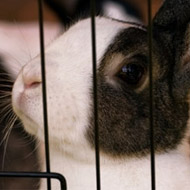Experts set out vision for rabbit welfare

The future looks brighter for rabbits in the UK.
A vision for improving rabbit welfare has been set out following research by the University of Bristol's School of Veterinary Sciences.
This is the first time the pet industry, welfare organisations, breeders and the veterinary profession have united to agree on a strategy to improve the welfare of rabbits in the UK.
The vision is based on recommendations from a study by the University of Bristol which revealed that the welfare needs of many pet rabbits in the UK are not currently being met.
The proposals outlined include that all rabbits sold or rehoused are to be kept in compatible pairs or groups, and that all rabbits should live in an environment which meets their physical, social and behavioural needs.
Lead author of the strategy, Dr Nicola Rooney, said: “We are delighted to have a vision for rabbit welfare that is strongly rooted in evidence-based information and it’s great that Bristol research is one of the key pieces of research underpinning the strategy.
“There is a growing body of scientific understanding on how best to meet rabbits’ health and behavioural needs. Both myself and my colleague, Richard Saunders, are part of the strategy group moving this vision forward and we’re very happy that everyone has joined forces to take this on board.”
Dr Jane Tyson, rabbit behaviour and welfare expert at the RSPCA, added: We are really excited that stakeholders in animal welfare, the pet industry, breeders and the veterinary profession have been able to come together to share this vision.
“We share a common goal which is improving the lives of rabbits - one of Britain’s most popular pets, but also arguably one of the most misunderstood.”
The Rabbit Welfare Vision Statement states that:
- All companion rabbits enjoy a good life in which they can experience positive welfare, ie good physical and psychological health) as well as being protected from pain, suffering, injury and disease.
- All rabbits have access to an appropriate diet, known to optimise animal health and minimise the risk of disease. This includes having continual access to both good quality fibre-based material, e.g. hay or fresh grass, to eat and fresh, clean water.
- All rabbits live in an environment which meets their physical, social and behavioural needs, eg to run, jump, graze, dig, rest and stand up on their hind legs without their ears touching the roof.
- All rabbits are sold or re-homed to be kept in compatible pairs or groups.
- All rabbits are bred, reared and kept in a way known to minimise their chances of developing fear of handling and other stimuli.
- All rabbits are given regular preventative health care as recommended by veterinary experts, eg vaccinated against myxomatosis and rabbit haemorrhagic disease (RHD), a virulent and fatal viral disease of rabbits, according to current vaccine licence recommendations.
- All rabbits are given appropriate and timely veterinary treatment to protect them from pain, disease and suffering.
- All those working with rabbits, including vets, retailers, breeders, rehoming organisations, undertake effective training programmes and have resources available to them on current good practice in housing and husbandry, the promotion of health and welfare, and the management of disease and welfare risks.
- All rabbit health and welfare advice and recommendations are based on international scientific knowledge and professional experience. The veterinary professions offers up-to-date expertise in recognition, management and prevention of disease and in practices to promote good welfare.
- The number of rabbits requiring rehoming, both privately and via rescue organisations, is minimised.
The organisations are now seeking for this vision to be incorporated into a Defra Code of Practice for rabbits in England, under the Animal Welfare Act 2006.



 The RCVS has announced a new version of its 1CPD mobile app, with enhanced features for veterinary surgeons and veterinary nurses to record their continuing professional development.
The RCVS has announced a new version of its 1CPD mobile app, with enhanced features for veterinary surgeons and veterinary nurses to record their continuing professional development.